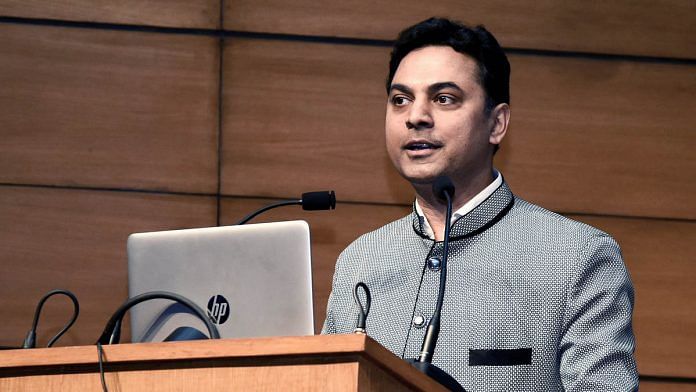New Delhi: The recent reform measures undertaken by the government will ensure that India’s medium- and long-term growth potential is not impacted by the Covid-19 pandemic, Chief Economic Adviser Krishnamurthy Subramanian said Monday.
Speaking at an event organised by lobby group Confederation of Indian Industry (CII), Subramanian also talked about the need for growth to be accompanied by job creation to make it sustainable.
“We don’t want Covid to create any permanent impact on the economy. In fact, we want to convert this crisis into an opportunity,” Subramanian said. But he acknowledged that Covid will have a short-term impact on growth.
The Indian economy is forecast to contract by 8-10 per cent in the current fiscal, though many international financial institutions and rating agencies have reduced the expected magnitude of the contraction.
Also read: Indian economy will struggle even after Covid, grow at 4.5% until 2025 – Oxford Economics
Slew of reforms
In the last few months, the Narendra Modi government has undertaken many reforms. These include labour reforms and the substantial changes and reductions made to labour laws through the introduction of the four labour codes.
The government has also made changes to the definition of which firms can be classified as micro, small or medium enterprises, to encourage them to grow bigger.
It has also introduced agricultural reforms aimed at freeing up farmers from selling their produce in designated market places and helping them get better price realisation.
“In the Covid crisis, there was an under-heating of the economy as it was a negative shock to demand. That is why reforms were considered to be necessary. We wanted to make sure that there will be no medium-term or long-term impact on growth,” Subramanian said.
The CEA said the negative demand shock will mean that India may see a current account surplus this fiscal, as against a current account deficit that is the norm for an economy like India with substantial dependence on imports.
He added that the reforms place the interests of the silent majority ahead of those of the vocal minority.
In last 50 years, growth has not been employment-intensive
Subramanian pointed out that in the last 50 years, “a lot of our growth has not been as employment-intensive. That is something that needs to change”.
He said sustained growth can happen only through job creation and not through jobless growth. “Jobless growth periods peter out, but growth that is accompanied by job creation creates demand and puts money in the hands of people,” he said.
Subramanian pointed out that the agricultural and labour reforms, the performance-linked incentive scheme announced earlier this month, as well as the changes proposed for MSMEs will provide a thrust towards greater formalisation of the economy.
The changes will ensure “macro configuration of the economy towards those sectors that are more employment intensive, especially the primary and secondary sectors”, he said.
Also read: It’s not just food prices, Covid pandemic has also helped push inflation to 7.6% in India



